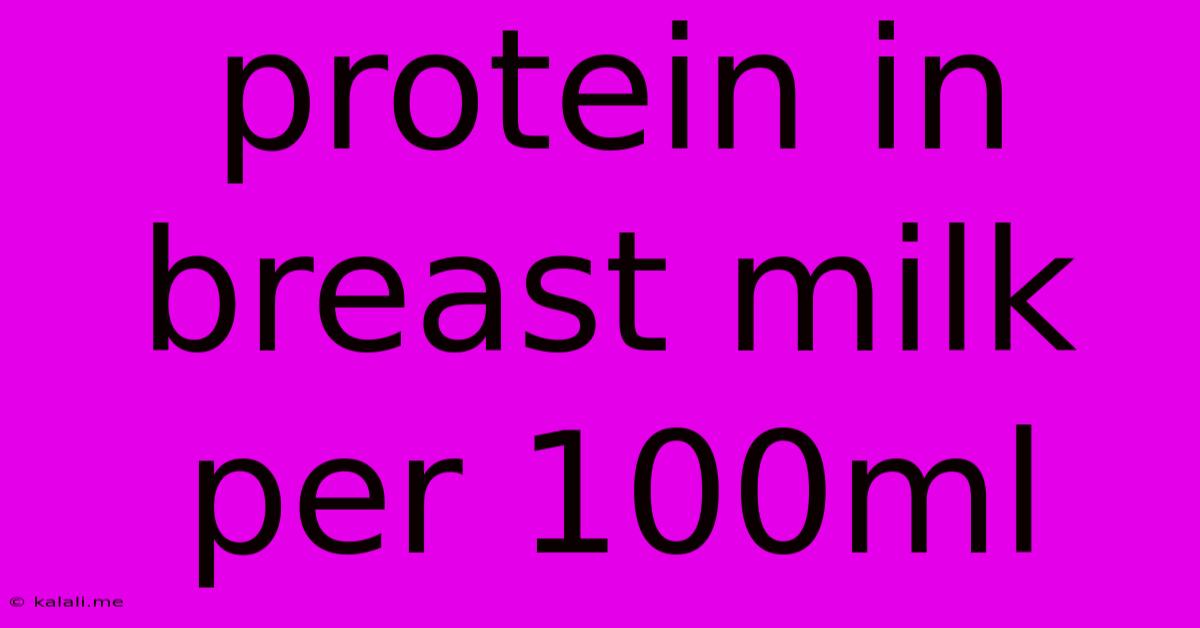Protein In Breast Milk Per 100ml
Kalali
Jun 12, 2025 · 3 min read

Table of Contents
Protein in Breast Milk Per 100ml: A Comprehensive Guide
Breast milk is widely recognized as the optimal source of nutrition for infants, providing a perfect blend of nutrients tailored to their developmental needs. Understanding the protein content within breast milk is crucial for both mothers and healthcare professionals. This article delves into the specifics of protein levels in breast milk per 100ml, exploring variations and their significance.
Key takeaway: Breast milk protein content varies depending on several factors, but generally falls within a healthy range to support infant growth and development. While the exact amount fluctuates, understanding the composition and benefits of these proteins is key to appreciating the nutritional power of breast milk.
How Much Protein is in 100ml of Breast Milk?
The protein concentration in breast milk isn't a fixed number. It naturally fluctuates based on several factors, including:
-
Stage of Lactation: Colostrum, the first milk produced after birth, is higher in protein than mature milk. Colostrum typically contains around 2.5 - 3.5 grams of protein per 100ml. As lactation progresses, the protein content generally decreases to around 0.9 - 1.2 grams per 100ml of mature breast milk.
-
Gestational Age of the Infant: Premature babies often require higher protein intake, and their mothers may produce breast milk with slightly elevated protein levels to meet this increased demand.
-
Maternal Diet: While the maternal diet doesn't drastically alter the overall protein content, it influences the types of amino acids present. A balanced diet ensures the breast milk contains a complete profile of essential amino acids.
-
Time of Day: Minor fluctuations in protein levels might occur throughout the day.
Therefore, providing a single definitive number for protein per 100ml is misleading. Instead, it's more accurate to understand the range of 0.9 - 3.5 grams per 100ml, recognizing the natural variability based on the aforementioned factors.
Types of Proteins in Breast Milk
The protein in breast milk isn't just about the quantity; the quality is equally important. Breast milk boasts a diverse array of proteins, each playing a crucial role in infant development:
-
Whey Proteins: These are easily digested and absorbed, providing readily available amino acids for growth. They make up a significant portion of breast milk proteins.
-
Casein Proteins: Though present in smaller quantities than whey proteins, casein proteins are also vital for growth and development. They are more slowly digested than whey proteins, providing a sustained release of amino acids.
-
Immunoglobulins (Antibodies): These are crucial components of the immune system, offering passive immunity to the infant against various infections. They are particularly abundant in colostrum.
-
Lactoferrin: This protein helps to bind iron, preventing its uptake by harmful bacteria and promoting iron absorption in the infant.
-
Growth Factors: These proteins promote cell growth and development in the infant.
The Importance of Protein in Breast Milk
The proteins in breast milk are essential for numerous aspects of infant development:
-
Growth and Development: Amino acids from proteins are the building blocks for new tissues, cells, and organs.
-
Immune System Support: Immunoglobulins and other proteins protect the infant from infections.
-
Digestive System Development: Easily digestible whey proteins support the development of a healthy gut microbiome.
-
Brain Development: Specific proteins and amino acids are crucial for optimal brain development.
Conclusion
The protein content in breast milk is dynamic and varies naturally. While a precise number for protein per 100ml is difficult to pinpoint, understanding the range, the types of proteins present, and their functions offers a crucial insight into the nutritional excellence of breast milk. This knowledge emphasizes the importance of breastfeeding for optimal infant growth, development, and immunity. Remember to consult with healthcare professionals for personalized advice regarding infant nutrition.
Latest Posts
Latest Posts
-
What Is The Opposite Of Hostile
Jun 13, 2025
-
Is A Magnifying Glass Concave Or Convex
Jun 13, 2025
-
River That Crosses The Equator Twice
Jun 13, 2025
-
How Do You Calculate Average Force
Jun 13, 2025
-
Which Earthquake Wave Causes The Most Damage
Jun 13, 2025
Related Post
Thank you for visiting our website which covers about Protein In Breast Milk Per 100ml . We hope the information provided has been useful to you. Feel free to contact us if you have any questions or need further assistance. See you next time and don't miss to bookmark.